- Home
- Cormac McCarthy
The Crossing tbt-2 Page 15
The Crossing tbt-2 Read online
Page 15
What does Caborca know of Huisiachepic, Huisiachepic of Caborca? They are different worlds, you must agree. Yet even so there is but one world and everything that is imaginable is necessary to it. For this world also which seems to us a thing of stone and flower and blood is not a thing at all but is a tale. And all in it is a tale and each tale the sum of all lesser tales and yet these also are the selfsame tale and contain as well all else within them. So everything is necessary. Every least thing. This is the hard lesson. Nothing can be dispensed with. Nothing despised. Because the seams are hid from us, you see. The joinery. The way in which the world is made. We have no way to know what could be taken away. What omitted. We have no way to tell what might stand and what might fall. And those seams that are hid from us are of course in the tale itself and the tale has no abode or place of being except in the telling only and there it lives and makes its home and therefore we can never be done with the telling. Of the telling there is no end. And whether in Caborca or in Huisiachepic or in whatever other place by whatever other name or by no name at all I say again all tales are one. Rightly heard all tales are one.
The boy looked into the dark disc of liquid in his cup that was not coffee. He looked at the man and he looked at the cats. They seemed to be sleeping to a cat and it occurred to him that the man's voice was to them no novelty and that he must talk to himself in the absence of any godsent ear from the outer world. Or talk to the cats.
What about the man that used to live here? he said.
Yes. This man's parents were killed by a cannonshot in the church at Caborca where they had gone with others to defend themselves against the outlaw American invaders. Perhaps you know something of the history of this country. When the stones and rubble were cleared away the boy lay in the arms of his dead mother. The boy's father lay nearby and he tried to speak. They raised him up. The blood ran from his mouth. They bent to hear what he would say but he said nothing. His chest was crushed and he breathed blood and he lifted one hand as if in farewell and then he died.
The boy was brought to this town. Of Caborca he remembered little. He remembered his father. Certain things. He remembered his father lifting him in his arms to see puppets performing in the alameda. Of his mother he remembered less. Perhaps nothing. The particulars of his life are strange particulars. This is a story of misfortune. Or so it would seem. The end is not yet told.
Here he grew to manhood. In this town. Here he married a wife and all in God's good time was himself blessed with a son.
In the first week of May in the year eighteen eightyaEU'seven this man takes his son and sets out on a journey. He will go to Bavispe and there leave the boy in the care of an uncle who is also the boy's padrino. From Bavispe he will continue on to Batopite where he will arrange for the sale of sugar from certain estancias to the south. In Batopite he will stay the night. This is a journey I have thought of many times. This journey and this man. He is youthful. Perhaps not thirty years of age. He rides a mule. The boy rides in the bow of the saddle before him. It is in the springtime and the wildflowers are blooming in the meadows along the river. He has promised to return with a gift for his young wife. He sees her standing there. She waves goodbye to him as he sets out. He has no likeness of her other than that which he carries in his heart. Think of that. Perhaps she is crying. Standing there watching him out of sight. Standing in the very shadow of this church that is doomed to fall. Life is a memory, then it is nothing. All law is writ in a seed.
The man had arched his fingers above the table to place the scene. He passed one hand from left to right to show where things had been and how it must have been with the sun and with the rider or with the woman where she stood. As if he'd shape out in the present air the spaces where such things had been.
At Bavispe there was a fair. A traveling circus. And the man held his young son aloft under the paper lanterns as his father before him so that the child might see. A clown, a magician, a man who held up serpents in his naked hands. The next morning he departed alone for Batopite as told, leaving the child behind. And there in Bavispe the child died, crushed in the terremoto. The padrino held the boy in his arms and wept. The town of Batopite was spared. Even today you can see the great crack in the mountain wall across the river like an enormous laugh. And that was all the news they had of disaster in Batopite. Nothing else was known. Returning to Bavispe the following day this man met a traveler afoot who told him the news. He could not believe the man's words and he urged the mule on and when he arrived at Bavispe all was in ruin as the traveler had told and death was everywhere in great abundance.
He entered the town already in terror of what he should find. He heard gunshots. Dogs ran out that had been at the bodies in the rubble and scampered past him and men with guns ran out and stood in the street shouting. In the alameda the dead lay on mats of river reed and old women dressed in black walked to and fro among the rows with green fronds to keep the flies away. The padrino came to him and wept at the mule's stirrup and could not speak but only took the reins in his own hands and led him sobbing. Through the alameda where lay dead merchants and farmers and the wives of merchants and farmers. Dead schoolgirls. Lying on reeds in the alameda of Bavispe, A dead dog in a carnival costume. A dead clown. Youngest of them all his son crushed and lifeless. He dismounted and there he knelt and clasped the bloody ruin of the child to his breast. The year is eighteen eightyaEU'seven.
What thoughts must have been his? Who cannot feel his anguish? He returns to Huisiachepic bearing across the mule's haunches the corpse of the child with which God had blessed his house. Waiting for him in Huisiachepic is the mother of the child and this is the gift he brings her.
Such a man is like a dreamer who wakes from a dream of grief to a greater sorrow yet. All that he loves is now become a torment to him. The pin has been pulled from the axis of the universe. Whatever one takes one's eye from threatens to flee away. Such a man is lost to us. He moves and speaks. But he is himself less than the merest shadow among all that he beholds. There is no picture of him possible. The smallest mark upon the page exaggerates his presence.
Who would seek the company of such a man? That which speaks in us one to another and is beyond our words or beyond the lifting or the turning of a hand to say that this is the way my heart is, or this. That thing was lost in him. So.
The boy watched him. His eyes were bright and he had placed one hand palm upward on the table as if within it lay the very thing lost. He closed his fist upon it.
We lose sight of him for some years. He abandons his wife in the ruins of this town. Many friends are dead. Of his wife nothing more is known. He is in Guatemala. He is in Trinidad. How could he return? Had he but saved some part of the burial of his life then perhaps there would have been no need to come with flowers and grief. And yet as it was there was no part of him left to do so. You see?
Men spared their lives in great disasters often feel in their deliverance the workings of fate. The hand of Providence. This man saw in himself again what he'd perhaps forgot. That long ago he'd been elected out of the common lot of men. For what he was asked now to reckon with was that he'd been called forth twice out of the ashes, out of the dust and rubble. For what?
You must not suppose such elections to be happy ones for they are not. In his sparing he found himself severed from both antecedents and posterity alike. He was but some brevity of a being. His claims to the common life of men became tenuous, insubstantial. He was a trunk without root or branch. Perhaps there was yet even then a moment when he would have gone to the church to pray. But the church lay in pieces on the ground. And in the darkened chancel within him had the ground also shifted, also cracked. There also was a ruin. A waste had opened in his soul and perhaps he saw with some new clarity how like the church he was himself but a thing of clay and perhaps he thought that the church would not be raised again as to do such work requires first that God be in men's hearts for it is there alone that it truly has its being and there failing no power can bu
ild it back again. He became a heretic. So.
After many a youthful wandering this man appeared at last in the capital and there he worked for some years. He was a bearer of messages. He carried a satchel of leather and canvas secured with a lock. He had no way to know what the messages said nor had he any curiosity concerning them. The stone facades of the buildings among which he went on his daily rounds were pitted with the marks of old gunfire. In places above the reach of people to collect them there yet remained smeared here and there the thin dark medallions of lead which had been rounds from machinegun emplacements in the streets. The rooms in which he stood waiting were rooms from which men in high office had been dragged to their execution. Need one say he was a man without politics? He was simply a messenger. He had no faith in the power of men to act wisely in their own behalf. It was his view rather that every act soon eluded the grasp of its propagator to be swept away yin a clamorous tide of unforeseen consequence. He believed that in the world was another agenda, another order, and with this power lay whatever brief he may have held. In the meantime he waited to be called to he knew not what.
The man leaned back, he looked up at the boy and smiled.
Do not misunderstand me, he said. The events of the world can have no separate life from the world. And yet the world itself can have no temporal view of things. It can have no cause to favor certain enterprises over others. The passing of armies and the passing of sands in the desert are one. There is no favoring, you see. How could there be? At whose behest? This man did not cease to believe in God. Nor did he come to have some modern view of God. There was God and there was the world. He knew that the world would forget him but that God could not. And yet that was the very thing he wished for.
Easy to see that naught save sorrow could bring a man to such a view of things. And yet a sorrow for which there can be no help is no sorrow. It is some dark sister traveling in sorrow's clothing. Men do not turn from God so easily you see. Not so easily. Deep in each man is the knowledge that something knows of his existence. Something knows, and cannot be fled nor hid from. To imagine otherwise is to imagine the unspeakable. It was never that this man ceased to believe in God. No. It was rather that he came to believe terrible things of Him.
By now he is a pensioner in Mexico. He has no friends. By day he sits in the park. The very ground under his feet is composted with the blood of the ancients. He watches passersby. He has become convinced that those aims and purposes with which they imagine their movements to be invested are in reality but a means by which to describe them. He believes that their movements are the subject of larger movements in patterns unknown to them and these in turn to others. He finds no comfort in these speculations I can tell you. He sees the world slipping away. All about him an enormous emptiness without echo. It was at this time that he began to pray. From no very pure motive perhaps. But then what would such a motive look like? Can God be cajoled? Can He be pled with or asked to see the reason in one's argument? Can anything from his own hand do aught to please Him more than had it acted otherwise? Can He be surprised? In his heart this man had already begun to plot against God but he did not know it yet. He would not know it until he began to dream of Him.
Who can dream of God? This man did. In his dreams God was much occupied. Spoken to He did not answer. Called to did not hear. The man could see Him bent at his work. As if through a glass. Seated solely in the light of his own presence. Weaving the world. In his hands it flowed out of nothing and in his hands it vanished into nothing once again. Endlessly. Endlessly. So. Here was a God to study. A God who seemed a slave to his own selfordinated duties. A God with a fathomless capacity to bend all to an inscrutable purpose. Not chaos itself lay outside of that matrix. And somewhere in that tapestry that was the world in its making and in its unmaking was a thread that was he and he woke weeping.
On a certain day he rose and put his few possessions into an old valise he'd kept beneath his bed these years and descended the stairwell for the last time. He carried his bible beneath his arm. Like the peregrine minister of some paltry sect. In three days' time he was in the town of Caborca of sacred memory. Standing there by the river squinting up in the sunshine where the dome of the broken transept of the church of La Purisima Concepcion de Nuestra Senora de Caborca floated in the pure desert air. So.
The man shook his head slowly. He'd taken up his makings from the table and begun to roll another cigarette. Very thoughtfully. As if its construction were a puzzle to him. He rose and went to the stove and lit the cigarette with the same blackened splinter of wood and inspected the fire and shut the stove door and returned to the table and sat as before.
Perhaps you know the town of Caborca. The church is very beautiful. By the flooding of the river through the years much has been destroyed. The sanctuary and two bell towers. The rear of the nave and most of the south transept. What remains of it stands on three legs, so to speak. The dome hangs in the sky like an apparition and so it has hung for many years. Most improbably. No mason could devise such a structure. For years the people of Caborca waited for it to fall. It was like a thing unfinished in their lives. Events of doubtful outcome were made subject to its standing. It was said of certain old and venerable men that when they died the dome would fall and they died and their children died and the dome floated on in the pure air until at last it came to bear such import in the minds of the people of that town that they scarce would speak of it at all.
This was what he came to. Perhaps he did not even consider the question as to how he had been brought to this place. Yet it was the very thing he sought. Beneath that perilous roof he threw down his pallet and made his fire and there he made ready to receive that which had eluded him. By whatever name. There in the ruins of that church out of whose dust and rubble he had been raised up seventy years before and sent forth to live his life. Such as it was. Such as it had become. Such as it would be.
He drew slowly on the cigarette. He studied the rising smoke. As if in its slow uncoiling lay the lineaments of the history he told. Dream or memory or builded stone. He tapped the ash into the bowl.
The people of the town came and they stood about. At a certain distance. They were interested to see what God would do with such a man. Perhaps he was a crazy person. Perhaps a saint. He paid them no mind. He paced and muttered into his bible and he thumbed the pages. Overhead in the vault were frescoes depicting the very events he pondered. On the west wall of the dome the clay nests of golondrinas mortared up among the fading vestments of the saints. From time to time in his circling he'd pause and hold his book aloft and thump at a page with his finger and address his God at large. This is what they saw. An old hermit. A man with no history. Some said a holy man come among them and some a lunatic and many were scandalized who'd not heard God addressed before in such a manner. Not seen God bearded in his very house.
It seemed that what he wished, this man, was to strike some colindancia with his Maker. Assess boundaries and metes. See that lines were drawn and respected. Who could think such a reckoning possible? The boundaries of the world are those of God's devising. With God there can be no reckoning. With what would one bargain?
They sent for the priest. The priest came and spoke with the man. The priest outside the church. The solitary parishioner within. Beneath the shadow of the perilous vault. The priest spoke to this misguided man of the nature of God and of the spirit and the will and of the meaning of grace in men's lives and the old man heard him out and nodded his head at certain salient points and when the priest was done this old man raised his book aloft and shouted at the priest. You know nothing. That is what he shouted. You know nothing.
The people looked at the priest. To see how he would respond. The priest studied the man and then went away again. The conviction with which the old man spoke had jarred his heart and he weighed the old man's words and was troubled because of course the old man's words were true ones. And if the old man knew that then what else must he know?
He returned
the next day. And the day after. People came to attend. Scholars of the town. To hear what was said on either side. The old man at his pacing under the shadow of the vault. The priest outside. The old man thumbing his book with a terrible dexterity. Like a moneycounter. The priest countering from those high canonical principles to which he gave such latitude. Both of them heretics to the bone.
He leaned forward and stubbed out the cigarette. He held up a finger. As if to countenance caution. The sun had entered the room by the south window and certain of the cats had risen to stretch, to rearrange themselves.
With this difference, he said. With this difference. The priest wagered nothing. He'd nothing at hazard. He stood on no such ground as the crazed old man. Under no such shadow. Rather he chose to stand outside the critical edifice of his own church and by this choice he sacrificed his words of their power to witness.
The old man by whatever instinct stood on ground at once blessed and fraughtful. This was his choice, this his gesture. All agreed his testimony was a powerful one. The strength of his conviction was plain to them. In his words there was little measure and little of restraint. In his new life the libertine was out. Do you see? By his arrogance he had engaged the living thing. On that perilous ground he had made of himself the only witness there can ever be and if some saw in his eyes the rapture of madness what else would one look for in one who had enjoined the God of the universe on ground of that God's own choosing? For that is always the nature of such ground, perilous and transitory. And it is indeed so that you must make your case there or nowhere.
And the priest? A man of broad principles. Of liberal sentiments. Even a generous man. Something of a philosopher. Yet one might say that his way through the world was so broad it scarcely made a path at all. He carried within himself a great reverence for the world, this priest. He heard the voice of the Deity in the murmur of the wind in the trees. Even the stones were sacred. He was a reasonable man and he believed that there was love in his heart.

 The Road
The Road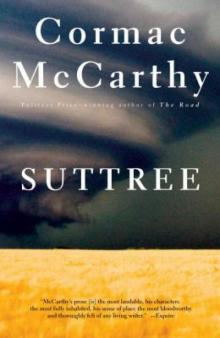 Suttree
Suttree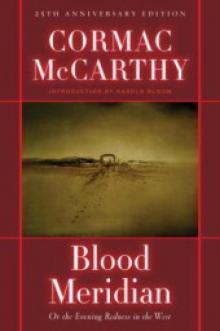 Blood Meridian, or the Evening Redness in the West
Blood Meridian, or the Evening Redness in the West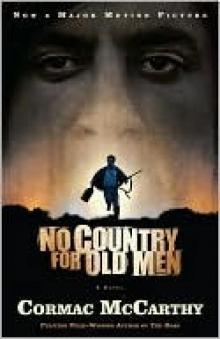 No Country for Old Men
No Country for Old Men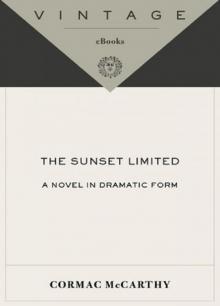 The Sunset Limited
The Sunset Limited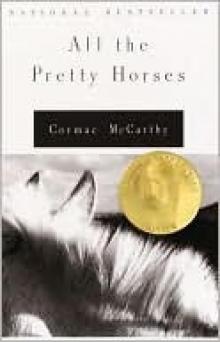 All the Pretty Horses
All the Pretty Horses The Crossing
The Crossing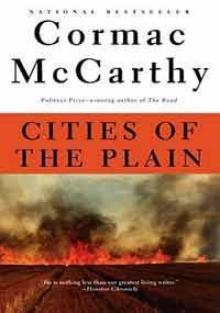 Cities of the Plain
Cities of the Plain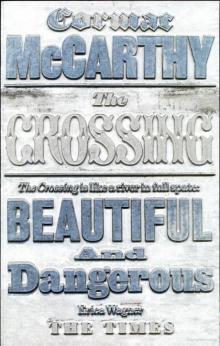 The Crossing tbt-2
The Crossing tbt-2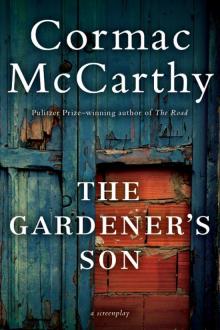 Gardener's Son
Gardener's Son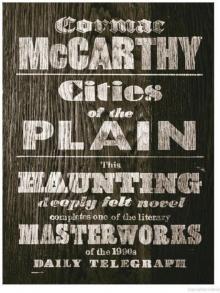 Cities of the Plain tbt-3
Cities of the Plain tbt-3 The Stonemason
The Stonemason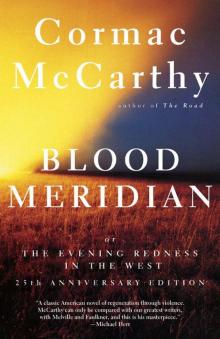 Blood Meridian: Or the Evening Redness in the West (Vintage International)
Blood Meridian: Or the Evening Redness in the West (Vintage International)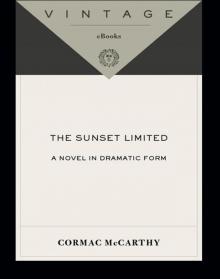 The Sunset Limited: A Novel in Dramatic Form
The Sunset Limited: A Novel in Dramatic Form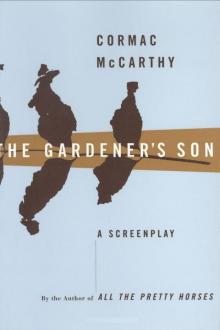 The Gardener's Son
The Gardener's Son